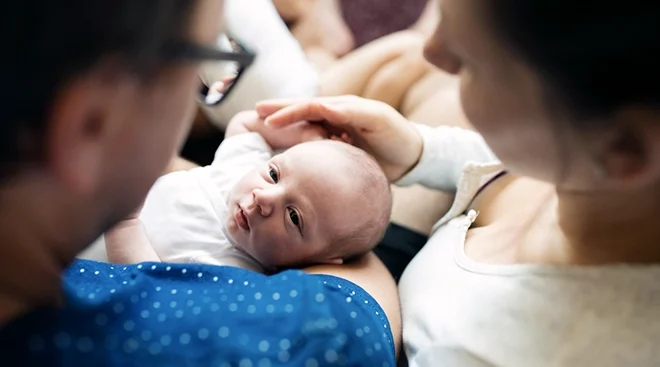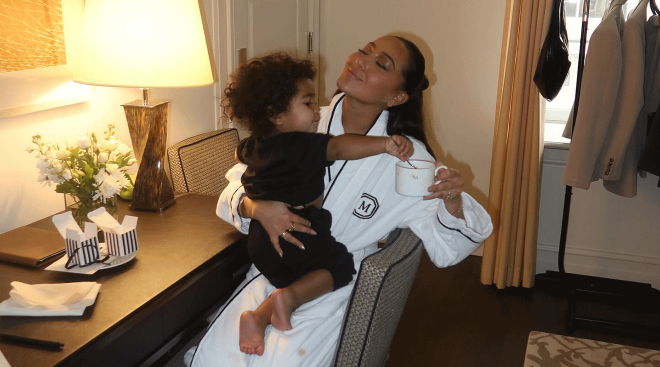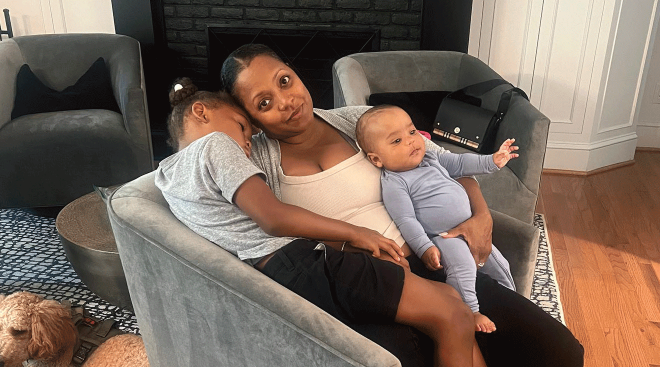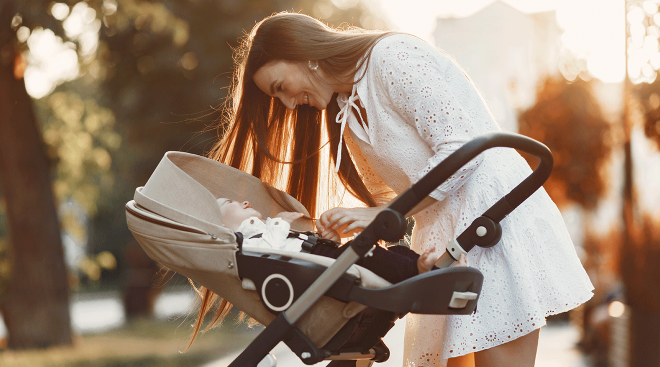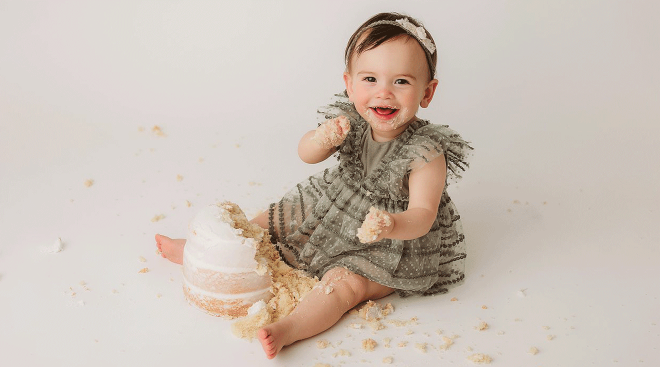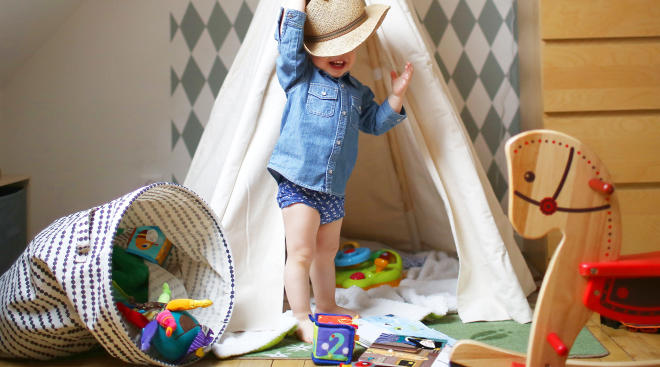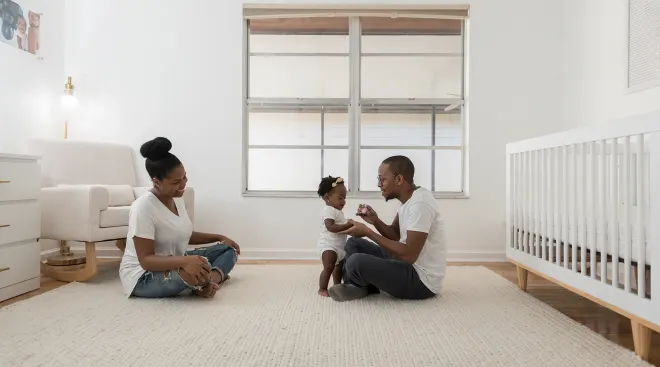Bonding With Baby: How Long Does It Take to Connect With Your Newborn?
Bonding with baby is one of the storied joys of new parenthood. We’re told it should be instantaneous and magical. But the truth is: It doesn’t always work that way—and, as a result, new parents sometimes feel guilt, shame and anxiety when the connection is slower to form. If you’re struggling to bond with your little one, know that you’re not alone, and it doesn’t mean you’re doing anything wrong. This transition can be tricky. Moreover, there’s no definitive timeline, so give yourself grace and take it one day at a time. Read on to learn why forming a bond with baby is important, how and when that bond might form and what you can do to help things along.
“Affectionate bonding is as important to our survival as our physical needs of hunger,” says Carrie Krawiec, LMFT, a marriage and family therapist in Troy, Michigan. “Bonding or attachment helps children to establish a secure and safe base to grow other normal and developmentally appropriate behaviors.” When a strong parent-baby bond forms, the child knows you’ll be responsive, available, comforting and protective, especially in moments when they’re experiencing distress. “This gives the child confidence to explore and develop and be creative and autonomous as they test their developing abilities,” Krawiec adds.
Without a secure bond in place, a child may lack confidence that their parent will be consistently responsive, available and protective, potentially leading to feelings of anxiousness or distredistress; they may even become clingy or fearful of their environments, says Krawiec. Long-term, this can cause them to become avoidant, in an attempt to live life without the support or love of others.
But the parent-child bond doesn’t exclusively benefit baby—it also helps parents as they undergo this major life transition. The truth is, parenting can be hard; there will undoubtedly be good days and bad. “This attachment allows [you] to gain positive experiences with baby to help push through the tough days, and show unconditional love to baby and [yourself],” explains Elizabeth Lanter, LCSW, a clinical social worker in Milwaukee. “Remember, it’s a dance. Some days might be tough and you waltz, and some days are fun and you tango.”
So how do you bond with baby? Well, it’s less of an effort and more of a natural occurrence. “It’s developed in the course of everyday care,” explains Pierrette Mimi Poinsett, MD, a pediatrician in Petaluma, California. This includes simple acts like caressing, smiling, singing, touching, holding, rocking and interacting with eye contact and singing. Skin-to-skin contact is another important way to facilitate bonding. Your relationship with baby builds over time as you learn to care for them, and they learn what that love feels like. It’s symbiotic—and it can be immediate or more of a slow burn.
“It’s important to know that bonding with baby doesn’t have to look like it does in the movies,” says Vanessa Houdek, PhD, PMH-C, a Chicago-based clinical psychologist. “It’s not uncommon for the bond with baby to form over the first several days and even weeks after childbirth as new parents adjust to bringing baby home.”
In other words: Don’t put a timeline on your relationship with baby. “We’re all different, and every new parent experiences their own unique birth story,” Houdek says. “Essentially, babies are strangers in our homes for the first weeks. Learning one another [through] time spent together can be part of the bonding process,” she adds. That said, bonding may occur earlier if you’re the birthing parent, which makes sense, of course; after all, you felt those very real flutters and kicks for the last few months.
Houdek notes that adoptive parents, parents via surrogacy and non-birthing parents may potentially find it harder to initially connect. Rest assured that it will happen. She reiterates that time and touch are the most important tools to help you create and deepen your connection.
Let’s be clear: For the first few days and weeks, baby won’t give you much back in terms of interaction. It can be hard to give so much when you feel like you’re not getting anything back in return. But as your little one develops and matures, they’ll start to make eye contact, smile and provide positive feedback in the way of coos and giggles—and your attachment will deepen.
There are a number of things that can hamper the bonding process. If your delivery was unusually long, painful or traumatic, it could take you more time to heal and detract from or delay the bonding process. The same issue can occur if your newborn has serious health issues that keep them confined to the NICU. Colic, feeding issues and overall exhaustion can leave parents feeling overwhelmed and disconnected.
Postpartum depression, anxiety and stress can also affect bonding. Approximately 70 to 80 percent of new moms experience what’s known as the “baby blues,” according to the American Pregnancy Asssociation. It’s defined as a fleeting sadness that usually resolves within a couple of days after birth. “A parent with baby blues may feel angry with the new baby, partner or [their] other children,” explains Poinsett. “They may cry for no reason, have trouble sleeping or eating and question if they can care for the baby.”
Postpartum depression, on the other hand, lasts longer and may present with deeper feelings of sadness, anxiety or despair that prevent you from carrying out tasks to care for yourself or baby—and, certainly, this will affect your dynamic. Postpartum depression can occur anytime within the first year after baby’s birth. Reach out to your doctor or a mental health professional if you’re experiencing sadness, anxiety or hopelessness.
Bonding with baby doesn’t necessarily require a ton of effort; it’s more of a natural progression. That said, there are some steps you can take to help foster your connection:
- Facilitate touch. “Bonding occurs when parents make different kinds of contact with their baby,” says Poinsett. She recommends resting baby against your chest every day for a few minutes. Another hands-free option? Babywearing.
- Make the most of feeding time. Whether you’re breastfeeding or bottle feeding, try to focus on the task at hand and this special moment in time. “Increase attachment by making eye contact and smiling while holding and feeding,” advises Houdek.
- Talk to baby. It might feel silly talking to your newborn, but baby loves the sound of your voice. Poinsett suggests verbally walking through what you’re doing during diaper changes and bathtime.
- Sync your breathing with baby. Houdek recommends holding baby and matching their rhythmic breathing, or practicing deep breathing as a way to be mindful in the moment with your little one.
- Make silly faces. “Responding to baby when they cry with gentle but exaggerated facial expressions, such as a puffy-lip frown or big eyes and gaping mouth when they’re sad or startled will also help them to understand their own emotions as well as feel understood by you,” says Krawiec. This helps build trust, another cornerstone of a healthy attachment.
- Make time for play. Your newborn is a bit of a blob at the moment, and they’re not giving you much in the way of cues or interaction. That said, it’s never too early for early play. Don’t worry, singing songs and reading books count!
- Take breaks. It’s easy to feel touched out (and burnt out!) when you have a little person depending on you every moment of the day. This can lead to feelings of resentment and hinder your bond. It’s important to carve out time for yourself. Have your partner or a family member pitch in and help. The more relaxed and rested you are, the better your bonding time will be.
At the end of the day, remember to cut yourself some slack. No matter your path to parenthood, you’ve just experienced what can be an overwhelming shift. Do not feel guilty or ashamed if it’s taking you time to adjust. The most important aspect of bonding is responding to baby’s needs with love and tenderness. But if you’re worried about your relationship with your newborn, ask for guidance from your ob-gyn, pediatrician or a mental health professional.
About the experts:
Vanessa Houdek, PhD, PMH-C, is a Chicago-based clinical psychologist and perinatal mental health specialist.
Carrie Krawiec, LMFT, is a marriage and family therapist in Troy, Michigan.
Elizabeth Lanter, LCSW, is a clinical social worker, specializing in infant mental health, in Milwaukee.
Pierrette Mimi Poinsett, MD, is a pediatrician in Petaluma, California, and a medical consultant at Mom Loves Best. She earned her medical degree from the University of Chicago Pritzker School of Medicine.
Please note: The Bump and the materials and information it contains are not intended to, and do not constitute, medical or other health advice or diagnosis and should not be used as such. You should always consult with a qualified physician or health professional about your specific circumstances.
Plus, more from The Bump:
[Am I Doing Enough With My Newborn?]https://www.thebump.com/a/things-to-do-with-baby
Navigate forward to interact with the calendar and select a date. Press the question mark key to get the keyboard shortcuts for changing dates.
































